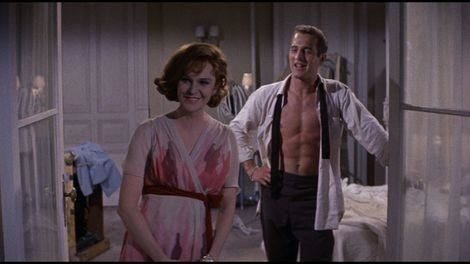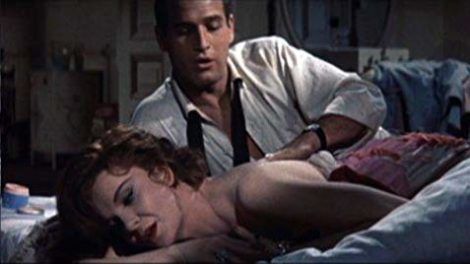Sweet Bird of Youth
Front Row at the Movies by Shirrel Rhoades
[mr_rating_result]What’s a playwright to do? Tennessee Williams wrote as true as he could, his psyche pouring onto the pages like tears of rage. The New York Times described him as “a poet of the human heart.”
He said he could “only write about what he experienced – intuitively or existentially.”
His plays speak about homosexuality, substance abuse, and depression. He explored themes no one else wanted to talk about – addiction, madness, and sexuality.
There was a harshness of reality in his writing. He didn’t shy away from difficult subject matter.
 On stage.
On stage.
But movies were another matter.
Hollywood would often water down his messages, his languages, his imagery, his … rawness.
“Sweet Bird of Youth” is an example of this.
As with all adaptations of Williams plays from stage to screen, significant changes were made. That is to say, the film version was sanitized. In the new screenplay, Chance Wayne becomes a scheming drifter rather than a paid gigolo. There’s no mention of his childhood sweetheart’s infertility due to a venereal disease. The ending is heavily altered from the explicit sexual mutilation scene depicted in the stage version.
Even so, Paul Newman, Geraldine Page, Madeline Sherwood, and Rip Torn all recreate their 1959 Broadway roles for the 1962 feature film.
Other than the cleansing elements, the story itself generally remained the same:
Chance (Paul Newman) returns to his corrupt and vicious hometown of St. Cloud (Florida in this telling; Mississippi in the play) accompanied by a considerably older woman (Geraldine Page), a fading movie star we learn. Chance had been sent to Hollywood to seek his fortune, encouraged in that endeavor by hometown bigwig “Boss” Finley (Ed Begley). Chance is too naïve to understand that Finley was just trying to keep the ne’er-do-well ex-country club waiter away from his daughter Heavenly (Shirley Knight).
“Sweet Bird of Youth” will be showing Monday night at Tropic Cinema as part of this year’s Tennessee Williams Birthday Celebration. Sponsored by the Key West Art & Historical Society, along with its Tennessee Williams Museum, the event honors the legendary Key West playwright throughout the month of March. This is the last of a series of films based on his work for this year’s celebration.
 The movie version of “Sweet Bird of Youth” was adapted and directed by Richard Brooks (“Elmer Gantry,” “Cat on a Hot Tin Roof”). Despite being considered a rebel, Brooks still had to satisfy his masters at MGM. The script went through several drafts, wrestling with the play’s controversial ending in which Williams depicted the castration of Chance’s character.
The movie version of “Sweet Bird of Youth” was adapted and directed by Richard Brooks (“Elmer Gantry,” “Cat on a Hot Tin Roof”). Despite being considered a rebel, Brooks still had to satisfy his masters at MGM. The script went through several drafts, wrestling with the play’s controversial ending in which Williams depicted the castration of Chance’s character.
When Brooks finished satisfying the Production Code that hung like a shroud over movies of the early ‘60s, this “morbid, corrosive character study” reflected a somewhat happier ending. (Chance merely winds up with a broken nose – symbolically disfigured rather than castrated.)
Tennessee Williams was not pleased. Rather than his character, his film had been castrated.
Even Richard Brooks did not like the altered ending, it is said.
Nonetheless, Ed Begley won an Academy Award for his role as “Boss” Finley. Geraldine Page was nominated for Best Actress in a Leading Role, and Shirley Knight got a nod for Best Supporting Actress.
The film was picked by critic Roger Ebert as one of the Top Films of the Decade. But it wasn’t the raging prose that Tennessee Williams had in mind.
Email Shirrel: srhoades@aol.com


Ratings & Comments
[mr_rating_form]